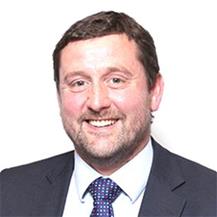Value: delivering for systems
 When prime minister Theresa May announced a new funding deal for the NHS and called
When prime minister Theresa May announced a new funding deal for the NHS and called
for the development of a 10-year plan in England, she said it should be a plan in which ‘every penny is well spent’. ‘It must be a plan that tackles waste, reduces bureaucracy and eliminates unacceptable variation, with all these efficiency savings reinvested back into patient care,’ she added. In essence, she was calling for a plan that delivers value – getting the best outcomes for the least cost.
There is a growing consensus that value-based healthcare is the best way to ensure health services meet the growing demands of the populations they serve while remaining sustainable over the long term.
Typically, the pursuit of value has been at the level of individual organisations. But increasingly there is a recognition that value can only be delivered at the level of whole systems.
For example, a hospital might optimise its treatment pathway such that admitted patients receive the best possible care in that setting. But real value might only be delivered if the patients had not been admitted in the first place – instead, being identified earlier and given support in a community setting.
In September, the HFMA Healthcare Costing for Value Institute organised a roundtable of clinicians and finance professionals to talk about progress in delivering value across systems. The roundtable, sponsored by biopharmaceutical company AbbVie and its Decisions with value programme, explored how different health economies were progressing on their own value journeys and the obstacles that needed to be removed to speed up current progress.
Contracting arrangements
Delegates reported that commissioners and providers in some areas were working more collaboratively than they had done in the past. In some cases this had been facilitated by different contractual arrangements. In other areas, contracting issues were blocking progress with delivering value across systems.
Lee Bond (pictured right), chief financial officer at Hull and East Yorkshire Hospitals NHS Trust, said Hull’s local health economy was only just starting to get into value-based healthcare, but a decision to move away from the activity-based payment by results system had led to a more productive relationship with commissioners.
Hull’s local health economy was only just starting to get into value-based healthcare, but a decision to move away from the activity-based payment by results system had led to a more productive relationship with commissioners.
‘Arguing on contracts was a waste of time,’ he said. ‘Now we look at how much money is in the system and agree what the system can afford, and where possible bring services back into the NHS. That’s led to a much better working relationship. We’ve not had a conversation about counting and coding in over 18 months and we’ve managed to make changes in a number of clinical areas, including some outpatient areas and around working with GPs.’
Aside from commissioner-provider relationships, Mr Bond said suppliers were starting to talk about different contracting arrangements for goods. ‘One pharmaceutical supplier wanted us to use an expensive dressing it claimed would significantly reduce surgical site infections and therefore reduce the number of occupied bed days within the hospital for these patients – and was prepared to guarantee this reduction. This is a completely different value proposition and one we need to be more open to. But, other than the obvious clinical input, we need to understand how we can evaluate these new types of deal.’
He added that it was not obvious how deals such as this could be taken forward with the new operating model for procurement, based around category towers providing a central purchasing function. ‘It is not clear how trusts will have these types of conversation directly with suppliers in the new world,’ he said.
Chelsea and Westminster Hospital NHS Foundation Trust has a lot of the foundations in place for delivering value, including a robust costing system – enabling it to identify the financial impact of changing services or outcomes – and a clinical director responsible for this year’s cost improvement programme (renamed as a quality improvement programme).
 ‘This feels quite advanced,’ said finance director Sandra Easton (left), ‘but we are struggling to have a quality conversation across the system. Instead, it is a contracting conversation and that is a big barrier to change.’
‘This feels quite advanced,’ said finance director Sandra Easton (left), ‘but we are struggling to have a quality conversation across the system. Instead, it is a contracting conversation and that is a big barrier to change.’
Outpatients were a good example, she said, with about 50% of first referrals in some specialties resulting in discharge back to GPs.
‘We know as a system we need to redefine those pathways, take what we can out of hospitals and take what we can through to telemedicine,’ she said. ‘But we are struggling to have those conversations because the first thing that happens is that people want to talk about how to contract for it. We need to define what we are going to do and then work out how we contract for it.’
She said the system had just agreed some rules of engagement, including setting out how risks and gains will be shared.
North Tees and Hartlepool NHS Foundation Trust has set up a hospital-at-home service for chronic obstructive pulmonary disease (COPD) patients. The service aims to keep people at home or, if patients are admitted, to discharge them as early as possible.
‘Within two hours of receiving a referral, seven days a week, 8am-8pm, the team of healthcare assistants, physios and nurses will do a home visit with a full assessment,’ said Catherine Monaghan (right), the trust’s clinical director for out-of-hospital care and consultant in charge of the service.
healthcare assistants, physios and nurses will do a home visit with a full assessment,’ said Catherine Monaghan (right), the trust’s clinical director for out-of-hospital care and consultant in charge of the service.
The service adds value in a number of ways. First, about half of these patients would previously have been admitted, so there is an immediate reduction of pressure on beds. Patients seen in A&E would most likely have been seen by a non-respiratory specialist and subject to a comprehensive set of tests. Now only tests that are absolutely necessary are undertaken. The service also identifies people who don’t have COPD but are on expensive inhalers they don’t need, or are making frequent visits to A&E, when different support would be more appropriate.
There has not been a single clinical incident in two and a half years, and the service has also found lung and laryngeal cancers in patients. ‘We save about 100 bed days a month,’ said Dr Monaghan. That is not enough to close beds, but it is enough to not have to open extra beds in the winter, when COPD demand rises.
However, she agreed there was a disconnect with the contracting position. Commissioners weren’t convinced it was saving them as much as they would like and yet reducing admissions lost the trust money under the tariff system, providing a financial disincentive to running the new model.
‘If you ask clinicians, they will always say they need more resource,’ said Dr Monaghan. ‘But this needs to be reconsidered because it won’t happen. We can’t appoint more clinicians because there aren’t any qualified and ready to apply – so we have to do something different. This model works using highly skilled nurses and allied health professionals under the banner of one consultant. I couldn’t have 200 beds under my name in hospital but I can in the community.’
 Lucy Billington (left), assistant director of finance at Lancashire Teaching Hospitals NHS Foundation Trust, added a note of caution around changing contracting and funding arrangements without understanding how stranded costs will be managed. The trust is part of the system-wide ‘Our health, our care’ programme, which is taking forward clinically led work to develop new models of care across out-of-hospital, planned and urgent care. The system is developing a new provider-vendor model, pooling budgets across current services to deliver more joined-up care overall – services for frail elderly is one of the first areas being explored.
Lucy Billington (left), assistant director of finance at Lancashire Teaching Hospitals NHS Foundation Trust, added a note of caution around changing contracting and funding arrangements without understanding how stranded costs will be managed. The trust is part of the system-wide ‘Our health, our care’ programme, which is taking forward clinically led work to develop new models of care across out-of-hospital, planned and urgent care. The system is developing a new provider-vendor model, pooling budgets across current services to deliver more joined-up care overall – services for frail elderly is one of the first areas being explored.
‘In the trust, we are starting to think about the predictive forecasting we can undertake as patients come through the acute hospital door, but we also need to think about what more we can do to keep people out of acute care,’ she said.
‘But in making changes, we have to bear in mind that we are a huge infrastructure and if we move everything out, the hospital still has to cover its costs and remain sustainable.’
Shared decision-making
The Leeds Teaching Hospitals NHS Trust has recently adopted aligned incentive contracts in place of tariff-based arrangements. This provides the trust with an agreed level of income for expected activity, with payments only changing with dramatic, unexpected changes in activity. Consultant in critical care Stuart Murdoch said this is ‘beginning to take shape and make discussions easier’. However, he added that more fundamental changes were needed in what the NHS sought to deliver.
 'How often do we talk to patients about the outcomes they want?’ he said. ‘We work on the basis that the patient wants to see a consultant or that they want lots of tests. Sometimes it might be that all they want is reassurance.’
'How often do we talk to patients about the outcomes they want?’ he said. ‘We work on the basis that the patient wants to see a consultant or that they want lots of tests. Sometimes it might be that all they want is reassurance.’
Dr Murdoch (left) said the failure to talk to patients about their desired outcomes early in the pathway was particularly evident in intensive care, where clinicians were often taking difficult decisions for patients with no clear idea of their preferences.
Consultants were hardwired to intervene to help patients, he added. A culture change was needed, with consultants more comfortable with recommending no treatment where the outcomes linked to treatment weren’t good.
Matthew Cripps (right), director of sustainable healthcare at NHS England and former director of the NHS RightCare programme, said the NHS was in fact driven by supply. He said the RightCare work was built on the premise that optimising quality and outcomes delivers sustainable healthcare. He suggested this was demonstrated for pathways but not yet ‘on the bottom line at a health economy level’.
of the NHS RightCare programme, said the NHS was in fact driven by supply. He said the RightCare work was built on the premise that optimising quality and outcomes delivers sustainable healthcare. He suggested this was demonstrated for pathways but not yet ‘on the bottom line at a health economy level’.
‘The reason for this is that it is a supply driven system, not demand driven,’ he said. ‘Archie Cochrane’s thinking [Cochrane is the father of evidence-based medicine] shows that if we engage with patients at a sub-optimal point in the pathway, then it’s human nature for clinicians to do the best they can at that point – and that includes using the equipment that’s available to them, in that part of the pathway.’
The key to changing this, he said, was shared decision-making and understanding the personal preferences and outcomes that
were important to patients. For example, clinicians often recommended treatments without understanding a patient’s preferred outcomes. They didn’t set out the different options, risks and evidenced outcomes associated with different treatment paths – physiotherapy, for example, as an alternative to surgical intervention.
He suggested that clinicians were all keen to do their best for patients, but that shared decision-making, in its purest sense, isn’t yet culturally recognised as the thing to do.
Outcome focus
Alan Brace, finance director for the Welsh government health and social services group, and roundtable chair (pictured below), said better understanding of outcomes was crucial to value-based healthcare. He reinforced earlier comments about how contracting and competition could inhibit transformation, suggesting integrated boards with a population health focus and the lack of internal market in Wales provided a good foundation for system working. NHS Wales has committed to embedding a value-based approach across its health services as part of its A healthier Wales strategy.
 ‘But our problem is outcomes. We don’t have a common approach to outcome
‘But our problem is outcomes. We don’t have a common approach to outcome
measurement or improvement. We often talk about outputs rather than outcomes and the outcomes we measure tend to be clinical outcomes rather than functional outcomes that matter to patients.
‘So, we measure how well a surgeon puts a knee in, not what difference it made for the patient. And then research tells us that a lot of knee surgery shouldn’t be done in the first place. Or in diabetes, we measure blood sugar levels, but we ignore amputation rates that give you a very different picture and a very different view of resources used over time.’
He added that there was no internationally accepted system for measuring outcomes, which had led NHS Wales to working with the International Consortium for Health Outcomes Measurement. While there are criticisms that these outcome sets are still too clinical, Mr Brace said they were more rounded than many approaches. And they offered an approach that was consistent with a growing number of health systems around the world.
The most recent Commonwealth Fund report on international health systems had placed the UK 10th out of 11 on outcomes, he said, while ranking the UK first on care processes – underlining how the UK needed to change its focus from simple efficiency to effectiveness.
‘Understanding outcomes that meet the needs of the Welsh population – that is what should drive my allocation of our £7.3bn budget in Wales,’ he said. He added that Sweden was ranked second in terms of outcomes, but was poor on care processes. ‘It is easier to improve process than to improve outcomes and I think the market in England is a technically efficient system focused on volume at low cost.
‘That needs to be flipped into a system that allocates scarce resources to a service that itself has scarce staffing resources to drive best outcomes to meet people’s needs.’
Mr Brace highlighted work at Hamburg’s Martini-Klinik, a specialist prostate cancer centre, as an example of where the NHS needed to get to. With a database of long-term outcomes stretching back 25 years and a focus on outcomes that matter to patients, the clinic has produced impressive results.
While its five-year survival rate is on a par with the rest of Germany, it significantly outperforms other providers in terms of incontinence and erectile dysfunction rates.
There was a need to share how health economies were engaging with their communities to understand the outcomes that were important to them, he said.
Chris Randall (below, right) is assistant director of finance at Barking, Havering and Redbridge University Hospitals NHS Trust. However, he previously worked in the Cambridge health economy, which attempted to put together an outcome-based contract for the provision of community care and elderly emergency care in 2014.
‘My reflection is that you need to focus down a bit,’ he said. ‘We started with 215 outcome measures and, by the end of the process, we’d got it down to 75.’
outcome measures and, by the end of the process, we’d got it down to 75.’
Mr Randall suggested that this was still an unmanageable number of outcomes to be included in the contract. Instead there needed to be a focus on the key outcomes that the commissioner wanted.
And he added that the scale of the task was such that changing to an outcome focus could not be done across every patient stream at the same time.
The roundtable concluded that the first step in transforming services was understanding what needed to be delivered. That meant getting to grips with the treatment preferences and outcomes that matter to patients.
New models of delivery, contractual arrangements and different roles for practitioners should then be developed to best deliver these outcomes.
Expanded roles
Much of the current focus in the NHS is on stopping inappropriate referrals between primary and secondary care, but in fact practitioners on both sides should be working together to better manage patients. GP Craig Wakeham, chief clinical information officer at Dorset Clinical Commissioning Group, told the roundtable that the challenge was to upskill the non-medical workforce and use medical staff to support these news ways of working.
‘In the future, the integrated nursing team will do most of what I used to do as a GP and do it better,’ he said. Roles already include supporting diabetes and COPD patients, working with specialist nurses not instead of them.
As with the hospital at home programme in North Tees, he said more value could at times be added by a consultant supporting multidisciplinary teams rather than seeing all patients personally.
‘You often achieve the best return by doing a little for a lot of people, rather than a lot for few people,’ he said. ‘We should be looking to expand shared learning and collaborative working, not deskill each other.’
Non-medical staff could also take a lead role in conversations with patients about their treatment preferences. ‘Medics are sometimes protectionist of their current volumes of work and often other skillsets can deliver that part of the pathway, such as supported self-care,’ said NHS England’s Matthew Cripps. Nurses, health coaches, pharmacists and physiotherapists are well placed to take this role and reduce the burden on doctors, he said.
Dr Wakeham said medics could help to empower them to do this. There has been a drive towards consultant-delivered care in recent years, but he said the NHS needed to rediscover consultant-led care.
Understanding the costs
Costing data is fundamental to value-based decision making, helping clinical teams to understand the cost implications of existing and revised patient pathways. To support the delivery of value across systems, the NHS needs to be able to look at whole pathway costs, not just hospital costs. Although NHS Improvement is already supporting work to understand costs across systems, its current main focus is introducing a consistent approach to patient-level costing across acute, community, mental health and ambulance service providers.
Colin Dingwall is director of NHS Improvement’s Costing Transformation Programme. ‘The aim is to get to where every system consists of providers that can explain how much resource is consumed by each bit of activity,’ he said, ‘because that is the information, when plugged into the outcome data, that will generate the value equation we are all looking for.’
This first step was challenging, given the volume of data and range of different approaches in operation across different providers before the programme began. But it was important to get the building blocks in place. That process is reasonably well advanced with acute providers, and data has started to be fed back to the service via a dedicated portal. Other sectors are following their own transition paths.
However, Mr Dingwall said that in early summer, a pilot project kicked off in the Nottinghamshire Integrated Care System (ICS) to explore how a system view of costs and activity could be pulled together. ‘This is being led by clinicians with pathways they wanted to work on,’ Mr Dingwall said. The aim is to develop a solution that could be rolled out across other ICSs.
NHS Wales has made progress with patient-level costing, though some boards are more advanced than others. However, Aneurin Bevan University Health Board has used a different approach to costing to support its value work – time-driven activity-based costing (TDABC). While there is a US-view that this is the only useful costing approach to support value work, the board’s head of business intelligence and value Mark Bowling said patient-level costing and TDABC complemented each other well.
TDABC involves mapping a pathway and then working out the practitioner time consumed by each step. It builds up a rich picture of costs consumed, helping users to understand how a different allocation of resources might impact on outcomes. But, it takes more time as a technique. Mr Bowling said it would, therefore, be impractical to use across the board’s £1bn of expenditure.
‘In places, TDABC has delivered more rounded and accurate analysis than previously achieved. Elsewhere we employ a hybrid, where TDABC does the bits that patient-level costing doesn’t reach, helping to plug the gaps in a pathway,’ he said.
Participants
- Lucy Billington, assistant director of finance, Lancashire Teaching Hospitals NHS FT
- Lee Bond, chief financial officer, Hull and East Yorkshire Hospitals NHST
- Mark Bowling, head of business intelligence and value, Aneurin Bevan University Health Board
- Alan Brace, director of finance, health and social services, Welsh government
- Matthew Cripps, director of sustainable healthcare, NHS England
- Colin Dingwall, CTP director, NHS Improvement
- Sandra Easton, finance director, Chelsea and Westminster Hospital NHS FT
- Catherine Monaghan, clinical director, North Tees and Hartlepool NHS FT
- Stuart Murdoch, consultant, Leeds Teaching Hospitals NHST
- Chris Randall, assistant director of finance, Barking, Havering and Redbridge University Hospitals NHST
- Phil Schwab, director of government affairs, AbbVie
- Craig Wakeham, GP and chief clinical information officer, Dorset CCG
Related content
We are excited to bring you a fun packed Eastern Branch Conference in 2025 over three days.
This event is for those that will benefit from an overview of costing in the NHS or those new to costing and will cover why we cost and the processes.